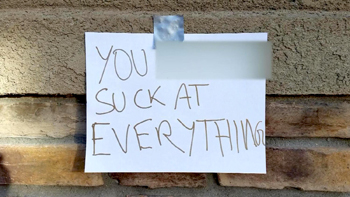Peyton, Feb 28: In another incident of hate crime in the US, a house of an Indian man was trashed with eggs, dog feces, and covered in racial slurs in Southern Colorado.
 The Federal Bureau of Investigation (FBI) is probing into the case which came to light on February 6.
The Federal Bureau of Investigation (FBI) is probing into the case which came to light on February 6.
Authorities believe it was the handiwork of a group of people.
“We saw more than 50 papers stuck everywhere on our door, window, car — they smeared dog poop everywhere and they had thrown at least like 40 eggs on our walls on our ceilings, everywhere outside,” the homeowner was quoted as saying by the CBS Denver.
He further said that racial slur like `You brown or Indian shouldn`t be here,` was also written outside the house.
The homeowner said despite the hate, he was reminded of compassion.
He said his neighbours came together and completely cleaned up the house for him.
On Wednesday night, Indian engineer Srinivas Kuchibhotla was killed and another techie Alok Madasani got injured when Adam W Purinton, a white man who earlier served in the US Navy, shot them at the Austins Bar and Grill in Olathe, Kansas state.
Purinton reportedly got into an argument with the victims and hurled racial slurs. He yelled "get out of my country", "terrorist" before shooting them.






Comments
To those who tell Indians or any \brown\" complexioned people to give up their dreams of settling in the US, I say we have every right to be here and are not going to run away because to do so will mean these domestic terrorists will win. There is a phrase you can die a thousand deaths every day by living in fear, or you can walk with your heads held up high. The choice is yours.
Enough is enough."
Indians should give up idea of settling in US....they can utilize their ability to develop India....
All these are because of most wanted hate monger Trump. He is a mess in US. No peace will regturn to US unless this hate monger is kicked out of US. He is not worth to be called as a human being. Indians are staying in US, working for the development of US economy and being respected till date. However, this hate issue is started ever since Trump jumped n politics. Many Indians had supported Trump and now they are feeling sorry for it.
Add new comment